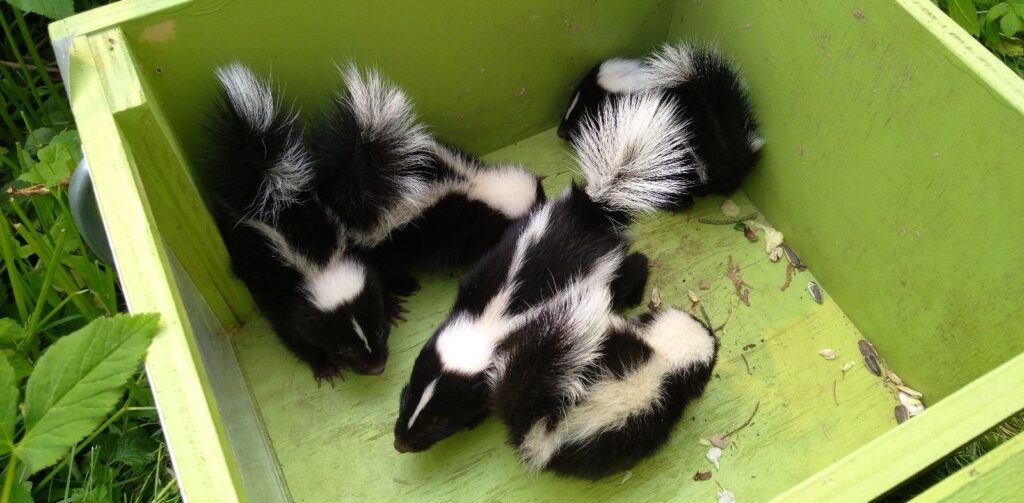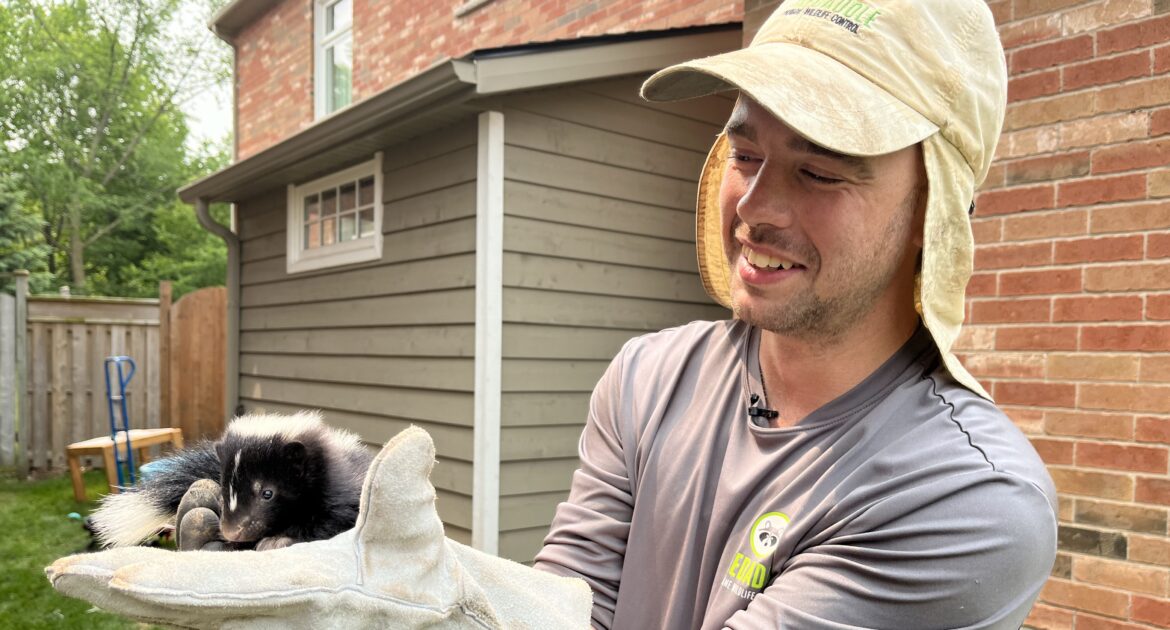As the golden hues of early fall cover Bethesda, there’s a noticeable change in temperatures and wildlife behavior. Among the busy fall wildlife, skunks stand out. These striped night visitors get more active, prepping for the colder months. In early fall, skunks search for food more and may look for new shelters, leading to surprise run-ins in neighborhoods.
So, what should you expect as the seasons change? Skunks, getting ready for winter, start intensifying their search for food and burrowing spots to keep them safe and warm once the freeze sets in. Understanding these behavioral shifts can help you avoid unwelcome surprises and keep your property wildlife-free.
Your trusted local experts, Skedaddle Humane Wildlife Control in Bethesda, are here to offer invaluable insights and humane strategies to manage these furry trespassers without the need for live trapping or relocation. This guide will walk you throughthe early fall activity of skunks, practical tips on prevention, and humane control methods to ensure harmony between humans and wildlife.
Watch Out for Wandering Skunks: Fall Behavior and Tips
As summer transitions into fall, skunks become more active. This period is marked by increased foraging and preparation for the colder months ahead. Skunks are nocturnal creatures, meaning they are most active during the night. They spend these hours searching for food to build up their fat reserves for winter.
In early fall, skunks tend to wander more in search of food, making them more noticeable. This increased activity often leads them closer to human habitats, where they can find easy access to food sources and potential shelter. Understanding this behavior is key to being prepared for any skunk-related issues.
Skunk activity typically involves foraging for food, digging for grubs, and seeking shelter. These animals are opportunistic feeders, consuming everything from insects and plants to small rodents. Their digging habits can leave noticeable damage in your yard, and their search for shelter might lead them under porches, decks, or sheds.
Signs of Skunk Presence Near Your Home
Wondering if skunks are making themselves comfortable in your yard? There are several telltale signs to watch out for that might indicate skunk activity around your property. One of the first indicators is the presence of small, shallow holes in your yard. These holes are created as skunks dig for insects and grubs, and finding them scattered around your home is a strong sign of skunk activity. Another clue is skunk tracks; their footprints are distinctive, showing five toes on each foot with visible claw marks. Additionally, you may come across skunk droppings in your yard, which are typically small, tubular, and contain bits of undigested food.
Perhaps the most telling sign of a skunk is the unmistakable smell. If you notice a strong, sulfur-like odor, it’s highly likely that a skunk has sprayed nearby. This scent can linger for days and is a clear indicator that skunks are active around your property. In some cases, you might even see a skunk wandering around at dusk or dawn, as they are primarily nocturnal. By keeping an eye out for these signs, you can quickly identify if skunks have taken up residence near your home and take the necessary steps to address the issue before it escalates.

Skedaddle’s Solutions to Skunk Problems
At Skedaddle Humane Wildlife Control, we use a variety of proven methods designed to safely and humanely manage intrusions. Our strategies prioritize the well-being of both the skunks and the residents, ensuring a positive outcome for all involved.
Skunks are known to burrow in the ground or seek shelter under structures like porches and sheds during winter months. Removing them from their dens without getting sprayed can pose a challenge, but it’s just the initial step. A comprehensive approach is crucial to prevent their return.
Our skilled technicians will start by fitting sturdy steel mesh 8-12 inches deep around your deck, shed, or porch to deter skunks from burrowing or gnawing their way back in. While this process necessitates moving a substantial volume of soil, we employ meticulous techniques to ensure your property remains pristine and undisturbed.
Once these barriers are in place, you can rest assured that the initial skunk won’t make a comeback. Moreover, your home will stay shielded from other skunks in the vicinity looking for refuge. Our screens are crafted to blend flawlessly with your current structures.
By choosing Skedaddle Humane Wildlife Control, you are opting for a humane, responsible, and successful method of managing the activity of skunks. For any skunk-related issues, remember who to call for the best in humane wildlife control solutions.
Preparing for Skunks in Winter
As the winter months approach, skunks begin to seek out sheltered areas to protect themselves from the cold. You’ll likely notice skunks in winter taking refuge under structures like porches, decks, and sheds, using these spots as dens where they can stay warm. They may also find their way into garages or crawl spaces if entry points are not properly sealed.
During this time, skunks spend less time foraging outside and more time in their dens, conserving energy. While they do not hibernate, their activity levels significantly decrease, but they can still emerge on warmer days to search for food. This makes winter a critical period to ensure your property is properly secured against potential intrusions.
To avoid any surprise guests, it’s crucial to take preventative measures before the winter season sets in. Firstly, inspect your property for any openings or potential entry points that skunks could use and seal them thoroughly. Remove any food sources such as pet food, garbage, and compost piles that might attract skunks. Additionally, installing motion-activated lights or sprinklers can deter these nocturnal visitors.
Proactive Measures for Homeowners
As fall progresses and temperatures drop, skunks become more active in seeking out warm, sheltered areas and reliable food sources. Homeowners can take proactive measures to protect their property from these nocturnal visitors by following these tips:
- Secure Garbage Bins: Use sturdy, well-sealed garbage bins to prevent skunks from accessing food scraps. Consider using bungee cords to secure bin lids.
- Remove Outdoor Pet Food: Avoid leaving pet food outside overnight, as this can attract skunks searching for an easy meal.
- Install Motion-Activated Lights: Place motion-activated lights around your yard. The sudden illumination can deter skunks from setting up camp near your home.
- Seal Entry Points: Inspect the perimeter of your house for any cracks, holes, or gaps. Seal these to prevent skunks from entering spaces like crawl spaces, garages, and basements.
- Maintain Your Yard: Keep your yard tidy by raking leaves, removing fallen fruit, and trimming bushes. A well-kept yard offers fewer hiding spots for skunks.
- Use Natural Deterrents: Sprinkle natural deterrents, like predator urine or cayenne pepper, around the perimeter of your yard to keep skunks at bay.
By incorporating these strategies, you can significantly reduce the likelihood of skunks making your home their winter refuge. If you find signs of activity of skunks despite these precautions, remember who to call for professional help in humane wildlife control solutions. Taking early preventive measures will ensure a comfortable and secure fall season for you and your family.
Your Local Experts at Skedaddle Humane Wildlife Control
As the seasons change, so does the behavior of local wildlife, including skunks, in Bethesda. During different times of the year, skunks adjust their habits to cope with the varying environmental conditions, such as looking for food, shelter, and warmth. These changes can lead to increased wildlife activity around homes and other structures as they search for ideal dens and reliable food sources.
At Skedaddle Humane Wildlife Control, we specialize in managing wildlife issues without the use of live trapping or relocation. Our methods focus on humane and effective strategies that protect both the animals and your property. With our experience and local knowledge, we’re here to help you navigate the challenges posed by seasonal changes and skunk behavior.
Understanding this behavior is crucial for preventing potential intrusions. If you’re wondering how to get rid of skunks or have noticed increased skunk activity on your property, contact us to request a quote and learn more about our humane wildlife control solutions. Our team is dedicated to ensuring a safe and secure environment for both you and the local wildlife.





